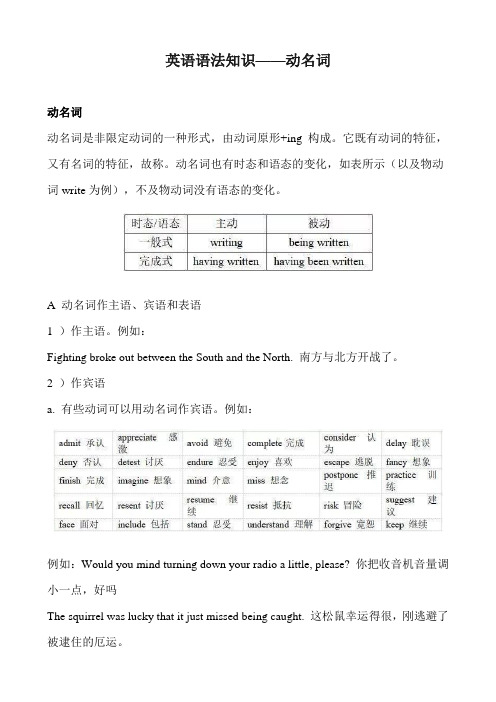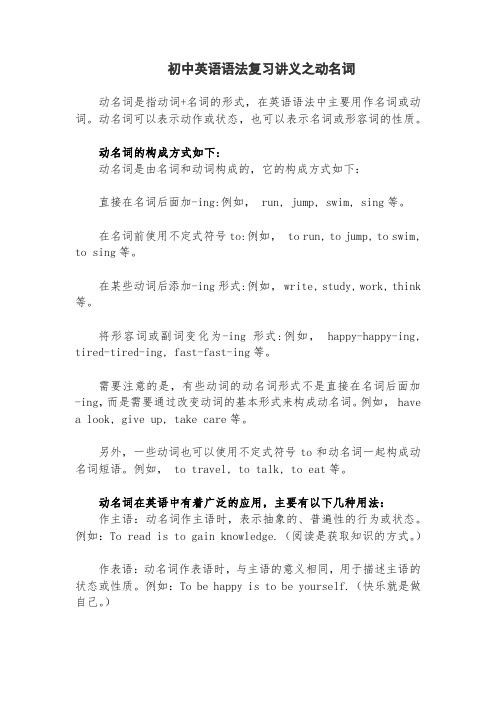英语:动名词课件
高中英语课件-动名词

具体的或一次性的动作 __S_w_i_m__m_i_n_g___(swim)is good for our health. ____T_o__s_w_i_m____(swim)in this river is not allowed
______
(laugh).
water
9.Water is uesed tgoe_tt_in_g__u_p_(water) flowers.
10.I am used to ___________(get)ewarolryk. ing
11.Though it rained,they went on_______
regret
cheating _______(say)that
we
can’t
stay
here
any longer.to say
go on doing 继续做原来做的事 go on to do 接着做另一件事
mean doing 意味着要做某事 mean to do 想要做某事
stop doing 停止做某事 stop to do 停下来(别的事)
非谓语动词
1.性质:它具有动词的特点,但在句子中起着 名词、形容词、副词的作用,充当主语、表语、 定语、宾语、宾语补足语、状语的作用,即:除 谓语以外的一切成分。
2.形式
不定式 相当于名词、形容词、副词。充
当主语、宾语、定语、表语、宾语补足语、 状语。
动名词 相当于名词充当主语、表语、定
语、宾语.
a writing desk cooking salt a dancing hall a meeting room
英语语法知识——动名词

英语语法知识——动名词动名词动名词是非限定动词的一种形式,由动词原形+ing 构成。
它既有动词的特征,又有名词的特征,故称。
动名词也有时态和语态的变化,如表所示(以及物动词write为例),不及物动词没有语态的变化。
A 动名词作主语、宾语和表语1 )作主语。
例如:Fighting broke out between the South and the North. 南方与北方开战了。
2 )作宾语a. 有些动词可以用动名词作宾语。
例如:例如:Would you mind turning down your radio a little, please? 你把收音机音量调小一点,好吗The squirrel was lucky that it just missed being caught. 这松鼠幸运得很,刚逃避了被逮住的厄运。
b. 有些结构后面可以用动名词作宾语或其他成分。
例如:3 )作表语,对主语说明、解释。
例如:Her job is washing, cleaning and taking care of the children. 她的工作是洗刷、清扫和照顾孩子。
比较:She is washing, cleaning and taking care of the children.4 )作定语,一般表示所修饰名词事物的用途。
例如:a writing desk=a desk for writing 写字台a swimming pool=a pool swimming 游泳池有些动名词作定语,与所修饰的名词关系比较复杂。
例如:boiling point=a temperature point at which something begins to boil 沸点a walking tractor=a tractor which a driver can operate while he or she is walking behind it手扶拖拉机B worth 的用法worth, worthy, worthwhile 都是形容词,意为"值得"。
英语动名词用法ppt课件

严格执行突发事件上报制度、校外活 动报批 制度等 相关规 章制度 。做到 及时发 现、制 止、汇 报并处 理各类 违纪行 为或突 发事件 。
2."There is no …”句式来表示
❖ There is no joking about such matters. 这种事开不得玩笑。
There is no littering about. 不许乱扔杂物。
严格执行突发事件上报制度、校外活 动报批 制度等 相关规 章制度 。做到 及时发 现、制 止、汇 报并处 理各类 违纪行 为或突 发事件 。
动名词作介词宾语
❖ 动名词作介词宾语时,通常放在由动词或形容词与介词组成 的动词短语或形容词短语后。此类短语有很多。如:look forward to(渴望,盼望), be proud of(以……自豪), be responsible for(对……负责), insist on(坚持), think of (考虑,想到), dream of(梦想), object to(反对,抗 议), hear of(听说), prevent…from(防止,阻止), keep…from(防止,阻止), stop…from(防止,阻止), be engaged in(从事于), depend on(依靠,依赖), thank…for(因……而道谢), excuse…for(因……而道 歉), aim at(目的在于), devote…to(献身于), set about(着手做), be/get used to(习惯于), be fond of (喜欢), be afraid of(害怕), be tired of(对……厌烦), succeed in(成功地做……), be interested in(对……感兴 趣), be ashamed of(对……感到羞愧)等等。
2025届高考英语一轮复习非谓语动词之动名词与现在分词课件

18
1)Toady there are more airplanes ___A______
more people than ever before in the skies.
A. carrying
B. carry
C. carried
D. to be carrying
2)The park was full of people _____C______
eg. His friend died, leaving him a lot of money, 6)作方式状语
I don’t like the idea of us / our not helping at all.
I don’t mind Jane buying another one. 注②:如果动名词的逻辑主语是表示无生命的东西的名词,或不定代词,就只能
用普通格,不能用所有格,如:
The boy was alarmed by someone knocking at the door.
名称
主语
非谓语动词的语法功能 宾语 表语 定语 状语
宾语补 足语
不定 式
√
√
√
√
√
√
动名 词
√
√
√
中学英语语法讲义:动名词

中学英语语法讲义:动名词一、概说动名词是非谓语动词的一种,它由动词原形加-ing构成,形式上与现在分词相同。
动名词除具有动词性质外,还具有名词的性质。
动名词在句中可用作主语、表语、宾语、定语、宾语补足语等,但不能用作谓语(故称动名词为非谓语动词)。
二、动名词的句法功能1. 用作主语Saving is getting. 节约即增收。
Finding work is difficult these days. 现今找工作可不容易。
Being lost can be a terrifying experience. 迷路有时很可怕。
注:动名词作主语时,有时可用it作形式主语。
如:It’s hard work climbing mountains. 爬山是费劲的事。
It’s fun being taken to the Zoo. 被带去逛动物园很有意思。
用it代替动名词作形式主语的两个常用句型:It’s no use saying any more about it. 再谈这事没有用。
Is it any good trying to explain? 试图作些解释有用吗?2. 用作表语My favorite sport is swimming. 我最喜欢的运动是游泳。
His job is looking after sheep. 他的任务是看羊。
Seeing is believing. 眼见为实。
注:不定式和动名词均可用作主语和表语,两者的区别是:动名词多指笼统的、抽象的概念,而不定式则多表示具体的、一次性的动作。
3. 用作宾语Excuse me for coming late. 对不起我来晚了。
Most students enjoy asking questions in English. 多数学生都喜欢用英语提问。
注:动词用作介词宾语时,通常只用动名词形式,而不用不定式形式,典型的例外是表示“除外”的except和but(它们后接动词作宾语时通常用不定式)。
中考英语动名词不定式PPT课件

I'll never forget _p_o_s_t_in__g__ a letter for the first time. 5. I remember __s_e_e_in_g___ her once.
3. 你不应该像这样老变主意。 You shouldn't keep changing your ideas like this.
4. Would you mind _m__y_c_o_m__in__g ( come )with you? 5. He practises ___sp__ea_k__in_g_(speak) English every day. 6. I couldn't help __c_r_y_in_g__( cry )when hearing the news.
涉及中考有关动词的一些用法
姓名 杨 莹
I.
promise, decide, hope, agree,
choose, fail, wish, learn + to do sth.
Eg. 1. He has promised to help me learn English.
2. The boy decided not to become a driver. 3. I hope to go to college. 4. He agreed to help us. 5. She chose to study English. 6. He failed to finish the work.
e.g I found it very important to learn English well. = I found that _i_t w__a_s_very important to learn English well.
高中英语语法---动名词

Her coming to help encouraged all of us. 他来帮忙鼓舞了我们所有人。 (=That she came to help encouraged all of us.) Jane’s being careless caused so much trouble. 简的粗心惹来了不少麻烦。 (=That Jane was careless caused so much trouble.)
2、作宾语
(1)作动词的宾语
某些动词后出现非限定性动词时只能用动名词作宾语,不能用不定式。常见的此类动词有:advise, allow, permit, avoid, consider, enjoy, finish, give up, cannot help, imagine, include, keep, keep on, mind, miss, put off, delay, practise, resist, suggest, depend on, think about, set about, succeed in, worry about, burst out, insist on, can’t stand, be used to, get used to, devote…to…, look forward to, pay attention to, get down to,escape 等。如:
高中英语语法 非谓语动词 动名词的用法课件(共58张PPT)

3) I shall never forget seeing the famous writer. 我__永__远___不__会__忘__记__见__到__过__那__位__著__名__ 作__家__。_
4) Don’t forget to write to your mother. 不__要__忘__了__给__你__母__亲__写__信__。_
E. go on doing 和 go on to do go on doing 继续做一直在做的事; go on to do 接着做另一件事。如:
1) 请接着做这同一个练习。
P__le_a_s_e_g_o__o_n_d_o_i_n_g_ the same exercise. 2) 请做另外一个练习。 P_l_e_a_s_e_g_o_o_n__t_o_d_o_ the other exercise.
一般式 完成式
主动形式 doing
having done
被动形式 being done having been done
一. 作主语 动名词作主语时,句子有三种形式:
①动名词直接置于句首主语的位置上。 1) 捉弄别人是我们万万不能干的.
_P_la_y_i_n_g_t_r_i_ck__s_o_n_o_t_h_e_r_s_ is something we should never do. 2) 学习新单词对我来说非常重要。
_it_i_s_p_l_e_a_sa_n__t _w_o_r___w_i_t_h_y_o_u_._____
③ 在there be结构中作主语,这种结 构的意思相当于“It is impossible to do… ” 如:
初中英语语法复习讲义之动名词

初中英语语法复习讲义之动名词动名词是指动词+名词的形式,在英语语法中主要用作名词或动词。
动名词可以表示动作或状态,也可以表示名词或形容词的性质。
动名词的构成方式如下:动名词是由名词和动词构成的,它的构成方式如下:直接在名词后面加-ing:例如, run, jump, swim, sing等。
在名词前使用不定式符号to:例如, to run, to jump, to swim, to sing等。
在某些动词后添加-ing形式:例如, write, study, work, think 等。
将形容词或副词变化为-ing形式:例如, happy-happy-ing, tired-tired-ing, fast-fast-ing等。
需要注意的是,有些动词的动名词形式不是直接在名词后面加-ing,而是需要通过改变动词的基本形式来构成动名词。
例如, have a look, give up, take care等。
另外,一些动词也可以使用不定式符号to和动名词一起构成动名词短语。
例如, to travel, to talk, to eat等。
动名词在英语中有着广泛的应用,主要有以下几种用法:作主语:动名词作主语时,表示抽象的、普遍性的行为或状态。
例如:To read is to gain knowledge.(阅读是获取知识的方式。
)作表语:动名词作表语时,与主语的意义相同,用于描述主语的状态或性质。
例如:To be happy is to be yourself.(快乐就是做自己。
)作宾语:动名词作宾语时,通常用于表达动作或行为的结果。
例如:To learn a new language requires time and effort.(学习一门新语言需要时间和努力。
)作定语:动名词作定语时,通常用于修饰名词,表示动作或行为的性质或特点。
例如:The art of painting requires practice and patience.(绘画需要练习和耐心。
英语:动名词PPT课件

.
4
2)作宾语:
① S. + vt.+ doing
避免错过 (少) 延期 avoid
miss
delay / postpone
建议完成 (多) 练习 suggest / advise finish practise
动名词用法
.
1
1.动名词形式
语 态 时态
一般 式
完成 式
.
主动式 被动式
doing
being done
having done
having been done
2
2.动名词的用法:
1)作主语
① Doing + v. + … no use no good no fun
② It`s + a shame a waste of time/money useless dangerous
D. to be doing
.
18
3.-----What do you think of the book ? (MET89)
-----Oh, excellent. It’s worth ______a second time.
A. to read
B. to be read
C. reading
help laughing. ⑤I don`t feel like going to see the film. ⑥He was busy preparing his lessons.
.
10
初中英语动词不定式和动名词的辨析PPT课件

Exercises
1. -- You’ve done very well this time. -- It’s really kind ____C__. A. for you to say so B. for you saying so C. of you to say so D. of you saying so
既可以接动词不定式又可以接动名词的动词
1. forget to do sth forget doing sth
2. remember to do sth remember doing sth
3. regret to do sth regret doing sth
4. try to do sth try doing sth
5. My father hates(痛恨) __D_. He never allows me _____. A. to smoke; to smoke B. smoking; smoking C. smoke; smoking D. smoking; to smoke
6. The girl was beginning _B__. A. get angry B. to get angry C. getting angry D. angry
2. It is better to lose one’s life than __C__. A. if you lose your spirit B. losing his spirit C. to lose one’s spirit D. your spirit getting lost
3. – I can’t work in this way. -- Why not __A__ it in some other way? A. try to do B. try doing C. trying to do D. trying doing
英语:动名词的用法课件

3. I regret not having worked hard. I regret to hear of your sister’s death.
devote oneself to
object to
look forward to,
contribute to
be (get)used to= be (get) accustomed to,
pay attention to, get down to,refer to
She looks forward every spring to _D___the flower-lined garden.
A. admit B. admitted C. admitting D. to admit
介词的宾语一般都用动名词,但有两个介词 but (except) / be about 后要接不定式作宾语。
(3)以介词to结尾的动词词组后接动名词。
prefer+doing +to+doing lead to
sth 3)Sb have trouble/difficulty(in)doing sth 4)stop/prevent/keep sb(sth)from doing.... 5)spend/waste ......(in) doing sth 6)prefer+n/v-ing..+to+n/v-ing
miss 错过
practise 练习
risk 冒险 suggest 建议
Unit4 动名词+不定式课件-2023届高三英语二轮复习

05
不定式作定语
2.动词不定式(短语)作定语修饰名词时,与其所修饰的词具有 一种动宾关系,如果不定式中的动词为不及物动词时,其后应加 上一个含义上所需要的介词。 • I have no chair to sit on.我没有椅子坐。 • He has no house to live in.他没有房子住。 • I have a lot of things to deal with.我有很多事要处理。
05
不定式作定语
4. 被 修 饰 名 词 为 attempt, ability, chance, desire, determination, decision, plan, way等为抽象名词或不定代 词something, nothing时,后面常用不定式作后置定语。 • But Janis Adkins has the ability and desire
03
动名词作宾语
4. 动词-ing形式作宾语时,如果动作不是主语发出,则需 加逻辑主语。 Would you mind opening the window? 你介意打开窗户吗? Would you mind me/my /Tom/ Tom’s opening the window? 你介意我 / 汤姆打开窗户吗?
05
不定式作定语
3.名词前有序数词,最高级, the only/any/no/all等限定词时, 只能用动词不定式。 • She was the first woman______(win) the gold medal in
the Olympic Games. 她是第一个在奥运会中赢得金牌的女性。
04
动名词作定语
1.动名词作定语表示被修饰词的某种性能或用途。
高考英语动名词

- 1、下载文档前请自行甄别文档内容的完整性,平台不提供额外的编辑、内容补充、找答案等附加服务。
- 2、"仅部分预览"的文档,不可在线预览部分如存在完整性等问题,可反馈申请退款(可完整预览的文档不适用该条件!)。
- 3、如文档侵犯您的权益,请联系客服反馈,我们会尽快为您处理(人工客服工作时间:9:00-18:30)。
1.advise/ suggest /recommend 2.allow/ permit/ forbid 3.consider/ think about 4.delay/ put off/ postpone 5.enjoy/ appreciate/dislike 6.avoid / escape/ miss 7.resist /can’t help 8.stand/ bear/tolerate/ understand 9.have a good time/ have fun 10.deny/ admit 11.be worth / be busy 12.have trouble/difficulty/problems doing sth
e.g.
① The house needs repairing. The house needs to be repaired.
The book is worth reading. ② The book is worthy of being read. The book is worthy to be read.
13.Missing the last bus means __________ home. A. to walk B. walking C. walked D. walk
14.My sister likes ________ but she doesn't like _________ this afternoon. A. swimming ... to swim B. to swim ... swimming C. swimming ... to swimming D. swim ... Swimming 15.I would appreciate _________ it a secret. A. that you would keep B. you to keep C. that you are keeping D. you keeping
⑤It`s no good getting up too late.
⑥There is no joking about the matter.
2)作宾语:
① S. + vt.+ doing
避免错过 (少) 延ቤተ መጻሕፍቲ ባይዱ avoid miss delay / postpone finish practise 建议完成 (多) 练习 suggest / advise
9.How about the two of us _____a walk down the garden? (MET93) A. to take B. take C. taking D. to be taking 10.----I must apologize for _____ahead of time. ----That’s all right. (NMET94) A. letting you not know B. not letting you know C. letting you know not D. letting not you know
喜欢想象 禁不住 enjoy/appreciate imagine resist/can`t help 承认 否定 (与) 嫉妒 admit 逃脱 冒险 (莫) 原谅 escape forgive 忍受 保持 (不) 在意 stand keep / keep on mind deny risk envy pardon / excuse
11.----You were brave enough to raise objections at the meeting. ----Well, now I regret _____that. (NMET95) A. to do B. to be doing C. to have done D. having done 12.My younger sister suggested _______ the Summer Palace first. A. me to visit B. mine visiting C. I visiting D. my visiting
妹妹 不吃 咖啡
(memepsg/kafi)
mind, enjoy/envy, miss, escape, practise, suggest, give up/keep on, avoid, finish, insist on
②作介词/短语动词的宾语:
S. + v. + prep. + doing
e.g.
① The room wants cleaning. ② The method needs improving. ③ This pair of shoes is past mending.
④ The problem is in need of working out.
⑤ The question is well worth discussing.
+ doing
e.g. ①Reading is important in learning English. ②Looking after the patients is a nurse`s job. ③It`s dangerous playing with fire. ④It`s a waste of time copying other`s homework.
look forward to be used to put off give up S. + keep on succeed in can`t help feel like be busy
+ doing
e.g. ①She sat there without speaking. ②I look forward to seeing him again. ③Are you used to living there alone? ④When my father heard the news, he couldn`t help laughing.
3)作表语:
S. + be + doing
e.g. ① His hobby is collecting stamps. ② My greatest happiness is serving the people.
4)作定语:
S. + v. + doing + n.
e.g. ① Does he work in the reading-room? ② Our teacher uses a very good teaching method. ③ His grandfather has a bamboo walking stick.
3.
动名词复合结构
:
1).物主代词 / 名词所有格 + 动名词 在句中作主语: e.g. ①Mary`s coming late made her teacher angry. ②Do you mind my smoking? 2).人称代词宾格 / 名词 + 动名词
在句中作宾语:
e.g. ①I`m sure of him coming on time. ②He has never heard of a woman being a pilot.
Exercises 1.She didn’t remember _____ him before. (MET88) A. having met B. have met C. to meet D. to having met 2.Go on ____ the other exercise after you have finished this one. (MET89) A. to do B. doing C. With D. to be doing
3.-----What do you think of the book ? (MET89) -----Oh, excellent. It’s worth ______a second time. A. to read B. to be read C. reading D. being read 4. I can hardly imagine Peter`s _____ across the Atlantic Ocean in five days. (MET91) A. sail B. to sail C. sailing D. to have sailed
A popular film star needs a cap.
Advise Practise object (to) prevent understand look forward to allow resist Finish insist on / imagine lead to mind / miss Suggest think of avoid risk No use escape enjoy delay stick to Admit Consider appreciate permit
7.I would appreciate _______back this afternoon. (MET92) A. you to call B. you call C. your calling D. you’re calling 8.______is a good form of exercise for both young and old. (NMET92) A. The walk B. Walking C. To walk D. Walk
